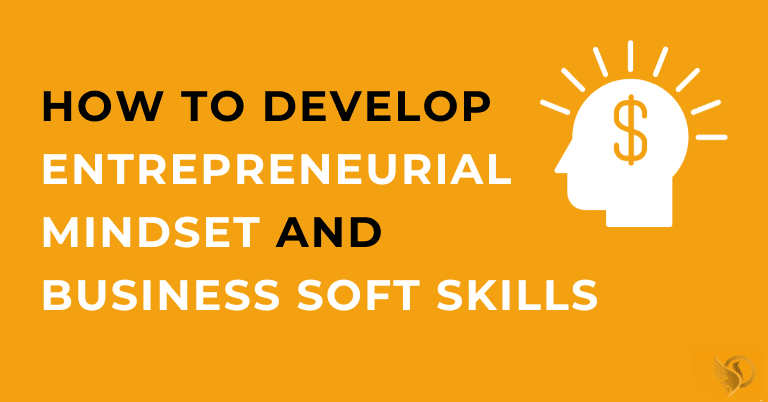While some people are naturally gifted with the ability to start and grow a business, others need specific training. These skills will determine your success as an entrepreneur. Successful entrepreneurs are adept at both hard and soft skills. Soft decision-making, problem-solving, and communication skills help you grow your business. In contrast, hard skills like marketing, accounting, and financial planning are essential for operating and managing a company. Becoming an expert in entrepreneurship skills takes practice and a focused learning plan.
This post will define entrepreneur skills, provide examples, explain how to develop them, and discuss business soft skills.
What abilities do entrepreneurs possess?
A variety of skill sets, including leadership, time management, business management, creative thinking, and problem-solving, are included in the skills of an entrepreneur. These abilities apply to a wide range of professions and sectors. These entrepreneurial abilities are essential for fostering competitiveness, business growth, and innovation. Acquiring these abilities requires acquiring a wide range of abilities. For instance, you need to hone your business management abilities and increase your willingness to take risks to succeed as an entrepreneur.
Entrepreneurship skills examples
Entrepreneurs frequently take on multiple responsibilities to establish and expand a company. This calls for a diverse skill set. Here are some examples of the kind of entrepreneurship skills you need to learn and hone:
Skills in business management
An entrepreneur must possess business management abilities to manage a company and ensure all objectives are reached. Entrepreneurs with this skill set, who have a solid understanding of each function, can supervise and manage the operations of various departments. Business management abilities include making important business decisions, assigning tasks to others, and multitasking.
Effective communication and attentive listening abilities
Effective communication with clients, team members, and other stakeholders is essential for any entrepreneur. Entrepreneurs need to communicate well, written and verbally, whether in meetings or via email, with updates and reports regarding the project. Entrepreneurs must be great listeners and communicators to comprehend project requirements and discussions during project meetings.
Risk Taking Ability
Among the most important things an entrepreneur can learn is how to take calculated, wise risks. Workers with an entrepreneurial mindset never hesitate to take calculated risks because they know that doing so can lead to enormous success. They know that taking a chance can teach you something new and help your company advance.
Candidates who are willing to take chances in the hopes of making a profit are desired by employers.
Networking Skills
Networking entails forming and maintaining relationships with other professionals to expand and market a business. Possessing strong networking abilities helps establish a strong brand and creates future opportunities. Through networking, business owners can meet like-minded individuals, form future teams, and remain current with market trends. Meeting professionals who can fund their ideas, access professional business expertise, and get feedback on their new venture or idea makes it one of the most sought-after skills for entrepreneurs.
Critical thinking abilities
Entrepreneurs who can think critically can evaluate data objectively and arrive at logical conclusions. It aids business owners in analyzing a problem and formulating a sensible solution. Candidates with critical thinking skills are sought after by employers as they aid in problem-solving and the development of business expansion strategies. A critical thinker is typically self-reliant, capable, and thoughtful. This ability aids in logical concept connections, information scrutiny, argument evaluation, work inconsistency detection, and complex issue-solving for entrepreneurs. Rather than committing facts to memory, these candidates use the information to draw important conclusions.
Ability to solve problems
Entrepreneurs frequently encounter difficult and unforeseen circumstances. Whether a venture capitalist declines more funding or a team member does not cooperate to complete the project according to the project specifications, an entrepreneur needs to be a skilled problem solver to manage pressured circumstances and coolly find alternatives. Outstanding problem-solving abilities guarantee they accomplish their business objectives.
Creative Thinking Skills
In the digital age, creativity is a valuable but undervalued skill. Innovation relies heavily on creative thinking, which also challenges conventional thinking in staff members. Fearless in the face of failure, creative thinkers are never afraid to try solutions that others might pass up. These individuals think creatively and are always open to receiving advice from experts in unrelated fields to gain fresh insight. One of the most in-demand abilities among entrepreneurs is the capacity to recognize patterns—even when none exist—and devise creative solutions for pressing business problems.
Skills in providing customer service
Good customer service boosts brand recognition and fosters customer loyalty. Good customer service abilities are critical for business success in any industry. Customer service abilities enable business owners to establish a connection with potential clients through conversations about funding options and client interactions.
Money management abilities
Entrepreneurs need to be resourceful, able to evaluate investments, and able to compute returns on investment. In addition, they need to be proficient in using accounting and budgeting software to monitor all financial activities. Learning financial skills helps entrepreneurs allocate resources optimally and prevent overspending.
Organizational abilities and time management
Time management that works organizes your workspace and boosts productivity. Procrastination can be avoided, and tasks can be prioritized differently by entrepreneurs with time management and organizational skills. Entrepreneurs who want to ensure that projects are completed on time analyze their own and their team’s productivity, assign tasks to others, prioritize tasks, make a to-do list, and use technology to keep their workspace organized.
Technical proficiency
Technical skills are hard skills acquired through the use of software and digital tools. Entrepreneurs need to be proficient with budgeting, marketing, and planning software. Software expertise is useful for project management, sales tracking, and budgetary allocation.
How to develop your abilities as an entrepreneur?
Gaining proficiency in these entrepreneurship skills will help you succeed in your work and lead your company to prosperity. You can attend seminars, enroll in a course, or read books to advance your knowledge. The following actions are essential for enhancing your entrepreneurship skills:
1. Examine business publications
Reading books is a great way to learn successful business tactics and to support your own personal growth. It sharpens your mind, facilitates better decision-making, and allows you to learn from other people’s mistakes. Thus, if you want to succeed as an entrepreneur, read books.
2. Sign up for a class
Take a management, marketing, or finance course to hone your skill set further. Enrolling in and passing a professional course can improve your financial planning and business management abilities.
3. Go to workshops
Attend networking events and workshops for entrepreneurs at all times. Seasoned business owners will present many of these workshops. It closes the knowledge gap and could provide insightful new information on managing your company successfully. These kinds of workshops are excellent for networking and chatting with business executives.
4. Take in podcasts
On a hectic day, listening to a podcast featuring prosperous business owners is among the best ways to learn about business. You can learn how different business owners use technology to accelerate their growth by subscribing to business podcasts. It enhances your ability to listen as well.
5. Engage a seasoned business advisor
Skilled mentors can assist you in acquiring the skills you lack. To learn how to run a business, you can spend some time working with a successful business owner. Another option is to have frequent meetings with a group of business associates who share your interests to discuss various brand development and promotion approaches. Mentors assist in offering insightful guidance and expert advice essential for success.
What are Business Soft Skills?
Soft skills are the aptitudes and characteristics that enable an individual to collaborate effectively. They frequently seem illusory and personal. Given that they are required in all industries at all levels, it might be more appropriate to refer to them as transferable professional skills.
Communication
Communication is essential for success in almost every aspect of life despite its complexity. Knowing what’s right or what to do is one thing; articulating that to the appropriate people at the appropriate time is quite another.
Social Competencies
Interpersonal skills are all those intangibles you need to relate to people well, form relationships, and create the right rapport to gain traction and win conversations. They are closely tied to communication.
Emotion Quotient
Being emotionally intelligent means having the capacity to both feel and recognize your own emotions and know what they are in the first place. A person with low emotional intelligence or emotional quotient may struggle to remain composed in formal settings such as the workplace or during class discussions.
Collaboration
You have likely completed a group project during your education. Another essential soft skill in today’s business world is collaborating effectively with people in a team or group setting.
Easy to Adapt
The individual who is steadfastly committed to what is now the incorrect course of action and will not adjust to the altered plans is even worse (especially in a business setting).
These two exhibit a lack of flexibility. A person with high adaptability can simply make changes and adjust to whatever shifting circumstances may arise.
Are you willing to develop Entrepreneurial Mindset and Business Soft Skills?
Developing an Entrepreneurial Mindset and Business Soft Skills is necessary for people who want to excel in their respective fields. However, you can easily learn soft skills through the Image Coach Shivani courses, which are easy to access and provide lifetime support. Get trained for your further corporate journey and be confident in your business soft skills.


